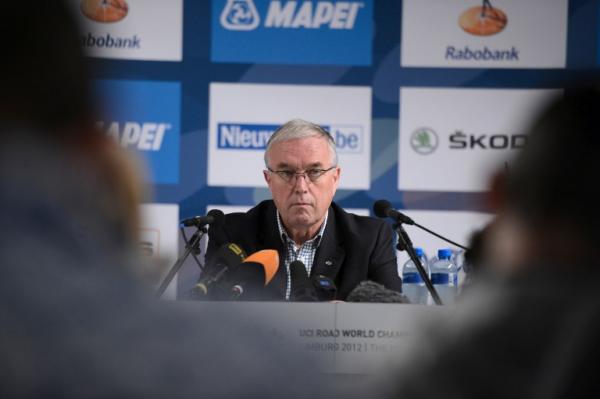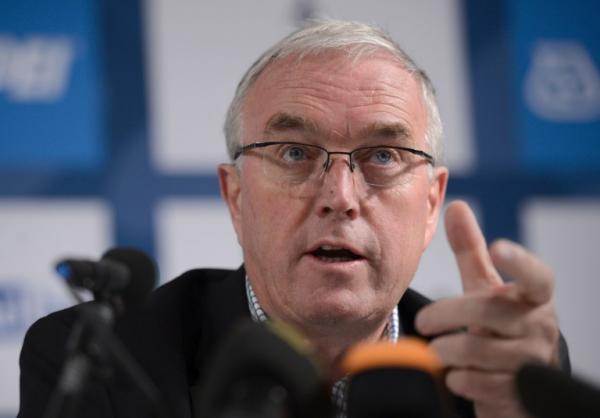UCI has nothing to apologise for, says McQuaid
Governing body still waiting for USADA's Armstrong file


UCI president Pat McQuaid has said that the governing body has "nothing to apologise for" in relation to its management of the sport during the Lance Armstrong era. In a press conference in Valkenburg on Saturday, McQuaid also said that the UCI was still waiting to receive the file from USADA's case against Armstrong, but at this point he did not envisage that they would appeal the matter to the Court of Arbitration for Sport (CAS).
"The UCI assumes that the reasoned decision and the file will justify USADA's position on all of the issues, but we still need to be able to go through those documents before giving our position," McQuaid said. "The UCI is ready to take its responsibility and unless USADA's decision gives us serious reason to do otherwise, we have no reason to go to CAS [to appeal their decision.]"
In August, Armstrong decided not to contest USADA's charges of doping and conspiracy, and faces being stripped of all results from August 1998, but McQuaid refused to speculate on who, if anyone, would be declared the winner of the seven Tours de France that Armstrong won between 1999 and 2005.
"At the moment that's a hypothetical question. We have to wait for the USADA file before deciding," McQuaid said.
During an hour-long press conference in which McQuaid refused to comment in depth on his decision to proceed with a defamation suit against journalist and former rider Paul Kimmage, he defended the UCI's management of cycling during his tenure and that of his predecessor Hein Verbruggen. He refuted the allegation made by both Floyd Landis and Tyler Hamilton that the UCI covered up a positive test from Armstrong at the 2001 Tour de Suisse.
"The UCI has nothing to be apologetic about. The UCI has always been the international federation that does the most against doping," he said. "In relation to hiding a sample, the UCI has never hidden the sample of any rider, in particular Lance Armstrong."
McQuaid also dismissed as a "fallacy" the allegation that the UCI had informed Armstrong of doping tests in advance, and said that other drug-testing bodies had also failed to snare the American in a positive test during his career.
The latest race content, interviews, features, reviews and expert buying guides, direct to your inbox!
"Armstrong claims to have done something in the region of up to 500 controls. I know for a fact that the UCI has done 215 of them. The other 280 were done by other agencies which could include USADA, WADA and AFLD. If the UCI was informing him about tests, then who was informing him from the other agencies?
"If the allegations are correct that people were beating the system, it's not the UCI's system, it's the system put in place by WADA. So I repeat, we have nothing to be apologetic about."
David Millar (Garmin-Sharp) was on hand at the press conference due to his work with the BBC during the Worlds, and he challenged McQuaid's assertion that the UCI had no cause for apology, expressing the wish that the governing body would show more humility.
"How can we be apologetic? We do more testing than anyone else. As I said already, we send those samples to laboratories and they do the tests. If we got information at any time on athlete we would act on that, but we've never had that," he told Millar. "You were one who did what you did [Millar confessed to doping in 2004 – ed.] and you didn't inform the UCI you were doing it. Others who have been caught since never informed the UCI what they did. The UCI is not to blame for the culture of doping in this sport."
Instead McQuaid limited himself to admitting that the recent past had been "a black period" for cycling, adding, "but that's not to apportion blame." He was also lukewarm on the idea of retroactively retesting stored urine and blood samples from the past decade.
"This issue naturally was discussed at length by the management committee and congress and the decision was made that the UCI should concentrate on the cycling of the day. That doesn't mean we ignore the past or that we're trying to hide it."
Amnesty
During the London 2012 Olympics, McQuaid had floated the possibility of an amnesty for riders who confessed to doping as part of a sort of truth and reconciliation commission for cycling, but he tracked back on the idea in Valkenburg.
"The UCI management committee discussed the possibility of an operation similar to what South Africa knew at the end of Apartheid with the Truth and Reconciliation Commission. The conclusion was that it would first be inappropriate to take any action while the USADA-Armstrong affair is underway and, in addition, the WADA code does not provide for any amnesty."
McQuaid expressed his empathy with the Italian federation's decision not to select riders named in doping investigations for the national team, although he wondered if it were legally enforceable. "From a legal point of view, it's difficult to support," he said. "From a philosophical point of view, I do support it."
In the midst of the Armstrong case, it has often been overlooked that his doctor, Michele Ferrari, and manager Johan Bruyneel, have also been charged by USADA, and McQuaid insisted that the UCI was serious about taking action against managers and doctors who encourage doping.
"If the UCI can get information on any doctor, trainer or manager who aids, abets or uses his influence in any way to bring riders into doping programmes, we will do what we can to get rid of him, but we need the information," he said.
McQuaid's term as UCI president comes to an end in 2013, but the Irishman confirmed that he was likely to stand for re-election in Florence next year. "At this point in time I would say yes. The reason I would say yes at this point is that there is still work to be done in the fight against doping and the globalisation of the sport. They are my two objectives."

Barry Ryan was Head of Features at Cyclingnews. He has covered professional cycling since 2010, reporting from the Tour de France, Giro d’Italia and events from Argentina to Japan. His writing has appeared in The Independent, Procycling and Cycling Plus. He is the author of The Ascent: Sean Kelly, Stephen Roche and the Rise of Irish Cycling’s Golden Generation, published by Gill Books.